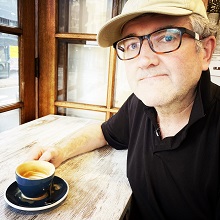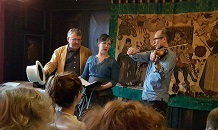Jon Mee
Visit Jon Mee's profile on the York Research Database to:
- See a full list of publications
- Browse activities and projects
- Explore connections, collaborators, related work and more
Profile
Biography
Jon Mee is Professor of Eighteenth-Century Studies in the English Department.
He came to York in 2013 after seven years at the University of Warwick as Professor of English and over a decade in the English Faculty at Oxford where he was Margaret Candfield Fellow in English at University College and Professor of the Literature of the Romantic Period. Before moving to Oxford, he was a Senior Lecturer at the Australian National University. Jon did his undergraduate degree at the University of Newcastle-upon-Tyne followed by a PhD at Cambridge. He was a Junior Research Fellow at Jesus College, Oxford, before moving to Australia in 1991.
His most recent book is Networks of Improvement: Literature Bodies and Machines in the Industrial Revolution (Chicago: Chicago University Press, 2023). The research for the book was supported by the R. Stanton Avery Distinguished Visiting Professor at the Huntington Library and a British Academy Senior Research Fellowship. Networks of Improvement was short-listed for the Kenshur Prize in 2024.
His previous book Print, Publicity, and Popular Radicalism: The Laurel of Liberty (Cambridge University Press, 2016, paperback 2018) drew on years of interest in the popular radical culture of the 1790s and the role of print in the emergence of popular politics. The research for the book was funded by an AHRC fellowship, but it drew upon material he encountered while writing his very first book: Dangerous Enthusiasm: William Blake and the Culture of Radicalism in the 1790s (Oxford: Oxford University Press, 1992).
Conversable Worlds: Literature, Contention, and Community 1762-1830 (Oxford University Press) drew on research funded by a Phillip J. Leverhulme Major Research Fellowship and came out in paperback in 2013. During the course of working on the book, he held fellowships at the University of Chicago (2008), the Yale Centre for British Art (2009), and the Australian National University (2009). He has also held a visiting fellowship at the University of New Delhi.
Jon was PI on the Leverhulme Major Project Grant ‘Networks of Improvement’ from 2011 to 2015. The project was concerned with the circulation of ideas of all kinds through social networks (regional, national, colonial), especially as they defined other kinds of knowledge in relation to the literary.
The work done on this project has developed in a number of other directions. It fed into the AHRC network grant – now completed - that he held with Dr Matt Sangster (University of Glasgow) on ‘Institutions of Literature’ now published as Institutions of Literature, 1700-1900. The AHRC network grant, in turn, fed into the Royal Society of Edinburgh-funded follow-up on the 1820s, which has fed into another collection of essays, Remediating the 1820s, also edited with Matt Sangster, which came out from Edinburgh University Press in 2022.
Research
Overview
Jon continues his interest in the intersection between cultural and economic issues in the industrial revolution via his involvement in the AHRC funded network ‘Interdisciplinary Dialogues in Industrial Landscapes’, a project that intersects with his recent teaching in romanticism and environment.
His work on Networks of Improvement also fed into his interest in the period’s literary physicians, especially those associated with the industrial northwest, and their research into medico-literary ideas like taste, imagination, and sensibility. These physicians include John Aikin junior, James Currie, Thomas Percival, John Ferriar, and James Phillips Kay. His near-obsession with Ferriar’s Essay towards a Theory of Apparitions (1813) fed into his 2023 Keats Memorial Lecture: ‘ “A waking Dream”: John Ferriar, Keats, and Medical Re-enchantment.’
The second direction in which this research has led him is towards developing his interest in environmental issues within the period, a key aspect of the ‘Interdisciplinary Dialogues in Industrial Landscapes’ network. 2021 saw the first iteration of his Green Romanticism Advanced Option Module as part of the undergraduate degree in the English Department at it has continued to flourish since.
Jon continues to be interested in various individual authors on whom he has previously written, Barbauld, Blake, Coleridge, Hazlitt, Keats, Wollstonecraft, and Wordsworth among them, but he is committed to supervising dissertations on authors across the 1760-1840 period. His work on the ‘transpennine enlightenment’ has given him a particular interest in Unitarian women writers associated with the region, including Barbauld, Hannah Greg, and Elizabeth Gaskell. He continues to be interested in scruffy radicals of the 1790s like Thomas Spence, Daniel Isaac Eaton, and Joseph Ritson (about whom he recently podcasted).
Beyond individual writers, his research concerns constructions of sociability in the period, and the work of literature and the visual arts not only in representing such sociability, but also as something that flowed through and constructed these networks. This extends into his work on the role of networks in the circulation of knowledge in the period, for instance, via the literary and philosophical societies that still exist in places like Manchester and Newcastle-upon-Tyne and the mapping of literary culture more generally in the Romantic period. The 1790s remains a particular decade of interest, and he retains a special research focus on the culture of radicalism as it manifested itself in ideas, various forms of social performance (from toasts to monster meetings), and print culture.
Teaching
Undergraduate
Jon is committed to excellence in teaching and was short-listed by York University Students Union for a teaching excellence award in 2024. His main undergraduate teaching is focused on the Green Romanticism module that he first taught in 2021 and which continues to flourish and develop year-on-year.
Postgraduate
Jon is open to supervision on any topic in the literature and print culture of the period 1760-1840. Particular authors of interest include Lucy Aikin, Anna Laetitia Barbauld, William Blake, William Hazlitt, the Sheffield poet James Montgomery, and William Wordsworth. He is especially interested in supervising dissertations on culture and the industrial revolution and romanticism and environment, topics in the 1790s and 1820s, anything in relation to the culture of radical politics, and dissertations related to sociability, the circulation of knowledge, clubs, societies and other institutions, or constructions of the ‘literary’ in the period 1760-1840.
Please don’t hesitate to contact him in relation to any research proposal in these areas.

Contact details
External activities
Overview
Jon speaks regularly at public events related to his research. His most recent appearances include the Leeds Libraries Festival in the summer of 2023 and the Keats Memorial lecture in October 2023
He has appeared on Rdaio4’s ‘In our Time’ talking about William Blake’s Songs of Innocence and of Experience and Charles Dickens’s A Christmas Carol. He is in podcasting on any of his research topics
In 2019, he hosted a suite of events in relation to the bicentennial of ‘Peterloo’ in 2019. These included an interview with Mike Leigh, director of the film Peterloo at the York Festival of Ideas. He also hosted two convivial ‘Beer and Ballads’ evenings which performed ballads from the period’s political protests (that’s him holding Henry ‘Orator’ Hunt’s trademark white hat).

Jon’s work for the ‘Networks of Improvement’ investigated the important role played by Literary and Philosophical Societies in the circulation of ideas. Many of these societies still exist, and he has given talks at these societies on their own histories. Two recent ones were at the Leeds Philosophical and Literary Society in 2019 at their bicentennial conference (they put ‘Philosophical’ first because they thought science was more important than the arts) and more recently at the Literary and Philosophical Society of Newcastle-upon Tyne available here on the society’s YouTube channel.

